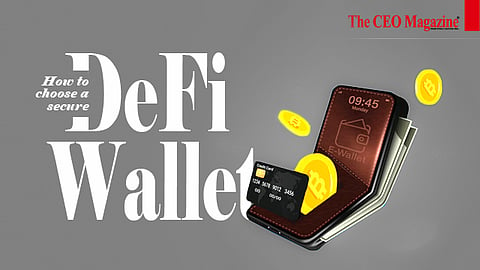

How to choose a secure DeFi wallet
The term "decentralized finance" is an acronym for a range of simplified services and products that remove all intermediaries from the financial industry.
In this sense, the blockchain provides the concept that records all transactions in a distributed ledger copy, which ensures that no single source is in control of its information.
The main reason for the rapid growth of DeFi is the ability to extend the concept beyond simple payments to more complex scenarios. decentralized exchanges, yield farming, open lending platforms, staking, and Stablecoins are some of the most well-known use cases.
There are fewer obstacles in these applications for users than are found in traditional banks, and user interest rates are higher compared to those offered by banks.
A decentralized finance gateway, more commonly termed a decentralized finance wallet, allows access to decentralized finance products and services. These features can be accessed via DeFi wallets, which become crucial for users.
This type of wallet was traditionally slow to operate and complex to use, but now they are becoming streamlined and easy to navigate for new users more than ever before.
Wallets are a core component of DeFi, allowing users to use new financial products through cryptocurrency as a gateway to Web 3.0, providing transparency, freedom, and ownership of their assets.
DeFi wallets act as access points that leave all power in the hands of the owners. A traditional bank on the other hand would retain control of all of a user's assets and would require a user identification and other relevant information to do so.
It further revolutionizes the financial industry since DeFi wallets do not require a third party. The good thing about DeFi wallets is that most of them operate as Web 3.0 wallets, meaning they're compatible with Ethereum (ETH) blockchains (although there are exceptions).
The fact that they are keys-based wallets that require users to retain responsibility for maintaining their private keys and their compatibility with DeFi applications are the similarities between these wallets.
The DeFi wallet also operates on a non-custodial basis, which ensures that funds can be accessed by only the wallet holder. DeFi wallets are among the safest solutions currently available on the market because of these reasons.
If the user loses their login information, the security of their account becomes the user's responsibility.
DeFi wallets can also help in boosting the security of crypto traders. While many traders use quantum-ai.io and other valuable tools for successful trades, having a secure wallet offers peace of mind.
Choosing the right DeFi wallet involves finding a solution that provides a minimum level of security, simplicity, guidance and convenience while supporting the right assets and products.
The majority of users are having difficulty deciding the best DeFi wallet option for them based on the number of options available. As a result, users need to carefully weigh their options before choosing.
A user's ability to support the asset they wish to hold is one of the most important factors to consider. As with any wallet, not every wallet will support the asset the user wishes to hold.
A reputation for security is a secondary consideration. Is the provider taking appropriate steps to ensure the security of its customers?
In addition, users should decide which products they would want to hold; as stated earlier, the available solutions provide different services from access to staking to yield farming. Users must also consider questions of usability after addressing some of the reasons stated above.
There are many wallets out there for users to hold their DeFi assets, before you select any wallet, ensure that they answer all of the questions mentioned above and once they have satisfied all the answers you can decide on the best option.
Follow us on Google News
